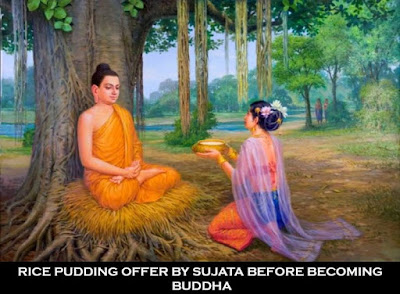§ 5. Abandonment of Asceticism
1. The austerities and mortification practised by Gautama were of the severest sort. They lasted for a long period of six years.Buddhism
2. At the end of six years his body had become so weak that he was quite unable to move.
3. Yet he had seen no new light, and was no nearer to the solution to the problem of misery in the world on which his mind was centred.
4. He reflected to himself, "This is not the way, even to passionlessness, nor to perfect knowledge, nor to liberation.
5. "Some undergo misery for the sake of this world, others meet toil for the sake of heaven; all living beings, wretched through hope and always missing their aim, fall certainly for the sake of happiness into misery.
6. "Has not something like this happened to me?
7. "It is not the effort itself which I blame,--which flinging aside the base pursues a high path of its own.
8. "What I ask is, 'Can the mortification of the body be called religion?'
9. "Since it is only by the mind's authority that the body either acts or ceases to act, therefore to control the thought is alone befitting--without thought the body is like a dog.
10. "If there was only the body to be considered, merit may [=might] be gained by purity of food, but then there is merit also in the doer. But of what good is it?
11. "New light cannot be attained by him who has lost his strength and is wearied with hunger, thirst, and fatigue, with his mind no longer self-possessed through fatigue.
12. "How could he who is not absolutely calm, reach the end which is to be attained by his mind?
13. "True calm and the self-possession of the mind is properly obtained by the constant satisfaction of the body's wants."
14. At this time there lived at Uruvela a house-holder, by name Senani. Sujata was his daughter.
15. Sujata had uttered a wish to a Banyan Tree, and vowed a yearly offering to it, if she should have a son.
16. The wish having been fulfilled, she sent her maid Punna to prepare the place for the offering.
17. Punna, finding Gautama sitting beneath the Banyan Tree, thought he was the god of the tree who had come down.
18. Sujata came and offered Gautama the food prepared by her, in a golden bowl.
19. He took the bowl to the river bank, bathed at a ford or a bathing place called Suppatitthita, and ate the food.
20. Thus ended his trial of asceticism.
21. The five ascetics who were with Gautama became angry with him for having given up the life of austerity and self-mortification, and in disgust left him.
2. At the end of six years his body had become so weak that he was quite unable to move.
3. Yet he had seen no new light, and was no nearer to the solution to the problem of misery in the world on which his mind was centred.
4. He reflected to himself, "This is not the way, even to passionlessness, nor to perfect knowledge, nor to liberation.
5. "Some undergo misery for the sake of this world, others meet toil for the sake of heaven; all living beings, wretched through hope and always missing their aim, fall certainly for the sake of happiness into misery.
6. "Has not something like this happened to me?
7. "It is not the effort itself which I blame,--which flinging aside the base pursues a high path of its own.
8. "What I ask is, 'Can the mortification of the body be called religion?'
9. "Since it is only by the mind's authority that the body either acts or ceases to act, therefore to control the thought is alone befitting--without thought the body is like a dog.
10. "If there was only the body to be considered, merit may [=might] be gained by purity of food, but then there is merit also in the doer. But of what good is it?
11. "New light cannot be attained by him who has lost his strength and is wearied with hunger, thirst, and fatigue, with his mind no longer self-possessed through fatigue.
12. "How could he who is not absolutely calm, reach the end which is to be attained by his mind?
13. "True calm and the self-possession of the mind is properly obtained by the constant satisfaction of the body's wants."
14. At this time there lived at Uruvela a house-holder, by name Senani. Sujata was his daughter.
15. Sujata had uttered a wish to a Banyan Tree, and vowed a yearly offering to it, if she should have a son.
16. The wish having been fulfilled, she sent her maid Punna to prepare the place for the offering.
17. Punna, finding Gautama sitting beneath the Banyan Tree, thought he was the god of the tree who had come down.
18. Sujata came and offered Gautama the food prepared by her, in a golden bowl.
19. He took the bowl to the river bank, bathed at a ford or a bathing place called Suppatitthita, and ate the food.
20. Thus ended his trial of asceticism.
21. The five ascetics who were with Gautama became angry with him for having given up the life of austerity and self-mortification, and in disgust left him.








0 Comments